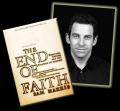The End of Faith

I recently completed a book of some note by Sam Harris, titled "The End of Faith." It is an interesting work because it doesn't take a stance against the standard, pin-headed fundamentalist versions of religion, but against moderates within religion also. Essentially, Harris feels that the moderates in religion perpetuate and increase the (now unacceptable) risk of fundamentalists arising in society. Here's a typically ascerbic quote:
- “By failing to live by the letter of the texts, while tolerating the irrationality of those who do, religious moderates betray faith and reason equally. . . . "
Or, of you don't like analogies --And I certainly don't-- I am aware of no empirical studies (much less a majority of said studies) which show that moderates in religion must create fundamentalists; thus, unlike Harris, I don't see any a priori reason to hold moderates as problematic (i.e. more risky) for greater society.
He also makes a move which I often see in people who wish science were the full and final authority in running human society:
- “To speak plainly and truthfully about the state of our world--to say, for instance, that the Bible and the Koran both contain mountains of life-destroying gibberish--is antithetical to tolerance as moderates currently conceive it. But we can no longer afford the luxury of such political correctness.”
Usually the more devastating arguments take standards of justification that both parties hold, such as Richard Carrier does in his hard-hitting expose of anti-faith. Of course, in this case most people are not in a position to evaluate evidentiary claims for or against any kind of scientific position. How much the less, therefore, can they evaluate a postion that finds wanting a whole philosophy (or religion) of life. When it comes right down to it, in a well-fed, stable, entertainment-oriented society, people are rarely forced to reason in order to find (what they take to be) a meaningful life. Technically, they confuse an "adequate" life with a "meaningful" one.



